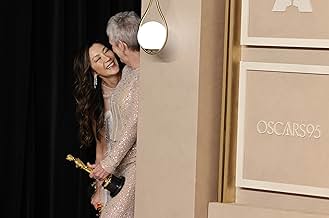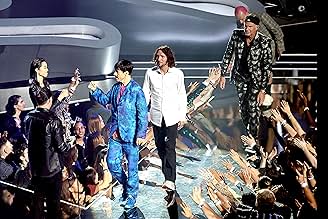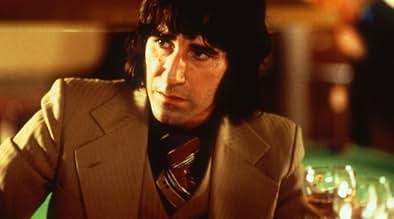Agrega una trama en tu idiomaPulling no punches in its depiction of soccer legend George Best's slow descent from the heights of his Manchester United career, the man once dubbed the fifth Beatle for his glamorous lifes... Leer todoPulling no punches in its depiction of soccer legend George Best's slow descent from the heights of his Manchester United career, the man once dubbed the fifth Beatle for his glamorous lifestyle and good looks.Pulling no punches in its depiction of soccer legend George Best's slow descent from the heights of his Manchester United career, the man once dubbed the fifth Beatle for his glamorous lifestyle and good looks.
- Dirección
- Guionistas
- Elenco
- Premios
- 2 premios ganados en total
- Dirección
- Guionistas
- Todo el elenco y el equipo
- Producción, taquilla y más en IMDbPro
Opiniones destacadas
This is dreadful. Jon Lynch is not handsome enough to play the part of George Best. We see nothing of the wit of the real character - merely a paranoid alcoholic. This film doesn't capture the soul of George Best at all. I am sure even ardent fans of Man United (which I am not) will find this film appalling. It's time to do a newer version now that the real George has passed away. With regard to other characters in the film, Linus Roache does a passable Denis Law, Ian Bannen is convincing as Matt Busby and Jerome Flynn is a good enough Bobby Charlton. One thing I found laughable though was that the same actor played the barman and Tommy Docherty - once with a wig, the other time without. Did they not have enough money to pay two actors ?
There are two big problems with this 2000 film, as viewed in 2013. One is that the life story of George Best (1946 - 2005) is now complete and that the final years (liver disease, sobriety, transplant, relapse into alcohol, death and national outpouring of grief) must be covered in any Bestie biopic.
The other is the casting of John Lynch as Best. Although he is reasonable as the saddened boozed-up older Best at the start and end of the film, the same actor cannot be used as the teenage phenomenon who burst onto the scene in the early 1960s and created the blueprint for the 'pop star' footballer, using his charm and good looks to endorse products (yes he did advertise sausages), open shops and do modelling.
With those two points out of the way, and they are substantial, the rest of the film isn't too bad. I liked the contemporary music (Good Vibrations, Green Onions, In a Broken Dream) but Cockney Rebel was a strange choice for the Northern Irishman. Maybe a bit of Thin Lizzie's Whiskey in the Jar would have suited better for the end credits. The major achievements of his career (1966 v Benfica, 1968 European Cup) are highlighted, though there's no mention of the league title they won in 1967. The almost equally famous team-mates Bobby Charlton, Denis Law, Nobby Stiles, Paddy Crerand are there, even though Tony Dunne appears to have lost his first name. The important father figures of Matt Busby and real dad Dickie Best are there too.
Linus Roche is particularly good as the practical joking Denis Law though Jerome Flynn not as good as hypochondriac Bobby Charlton. Patsy Kensit is surprisingly wooden as, I assume, a random girlfriend. Stephen Fry is another National Treasure but that doesn't mean that he should be shoehorned into every British film, nor that a film is necessarily improved by his inclusion.
This film really lost its way about fifty minutes in. The pace really slowed and it became difficult to watch. Did we really need to see stupid drunken conversations with his mates? However, it was good to see him put six goals past Northampton after a six-week lay-off. That did really happen, though the primal scream that follows in the film did not.
Where was Angie Best in all this? The American years? The international matches? The attempted come-backs at Fulham, Bournemouth, Stockport and Hibs? And the conversation with the deceased Matt Busby - oh dear! Overall, there needs to be a decent movie about George but this isn't it.
The other is the casting of John Lynch as Best. Although he is reasonable as the saddened boozed-up older Best at the start and end of the film, the same actor cannot be used as the teenage phenomenon who burst onto the scene in the early 1960s and created the blueprint for the 'pop star' footballer, using his charm and good looks to endorse products (yes he did advertise sausages), open shops and do modelling.
With those two points out of the way, and they are substantial, the rest of the film isn't too bad. I liked the contemporary music (Good Vibrations, Green Onions, In a Broken Dream) but Cockney Rebel was a strange choice for the Northern Irishman. Maybe a bit of Thin Lizzie's Whiskey in the Jar would have suited better for the end credits. The major achievements of his career (1966 v Benfica, 1968 European Cup) are highlighted, though there's no mention of the league title they won in 1967. The almost equally famous team-mates Bobby Charlton, Denis Law, Nobby Stiles, Paddy Crerand are there, even though Tony Dunne appears to have lost his first name. The important father figures of Matt Busby and real dad Dickie Best are there too.
Linus Roche is particularly good as the practical joking Denis Law though Jerome Flynn not as good as hypochondriac Bobby Charlton. Patsy Kensit is surprisingly wooden as, I assume, a random girlfriend. Stephen Fry is another National Treasure but that doesn't mean that he should be shoehorned into every British film, nor that a film is necessarily improved by his inclusion.
This film really lost its way about fifty minutes in. The pace really slowed and it became difficult to watch. Did we really need to see stupid drunken conversations with his mates? However, it was good to see him put six goals past Northampton after a six-week lay-off. That did really happen, though the primal scream that follows in the film did not.
Where was Angie Best in all this? The American years? The international matches? The attempted come-backs at Fulham, Bournemouth, Stockport and Hibs? And the conversation with the deceased Matt Busby - oh dear! Overall, there needs to be a decent movie about George but this isn't it.
You have to be thankful for small favours, so I am thankful for having seen the original version of this movie, 'cos I'm sure an Italian dubbing would have accomplished the hard feat of making this movie worse. First, the lack of continuity is so big it jumps (and dances) in front of you: how come Best's accent is so strong at the beginning and almost gone near the end? how come he arrives in Manchester has a teenager and three years later looks fortyish? This movie lacks rhythm, it doesn't have a story and doesn't go anywhere. This movie lacks insight: we are told the life of a man who was good at football and who one day starts drinking, gambling and womanizing out of the blue. We await for an explanation of any kind, but to no avail. However, Best is portrayed as a "poor victim": a victim of what? Of the fact that someone gave him big money to run around a ball? Please!!! This movie lacks acting, so badly it hurts: only Ian Bannen delivers, but he has to put with lines from an alternative version of the "Symposium" that make him sound like a cheesy Socrates (the philosopher, not the footballer). A particular shame in this department must be bestowed upon females. I would not dare saying "female characters": Sophie Dahl is better than Patsy Kensit (go figure!); the latter would have found it easy to play this role, since she's been married to a lame imitator of Best's excesses (a Gallagher, in case you didn't know), but she can't even draw from personal experience. This movie lacks football, and it lacks it a great deal: if I knew nothing about this sport I would find the "coreographed scenes" ridiculous. Also, why re-enact famous matches only to film them with a 1960's-telly effect?
For this, and many more reasons, this movie lacks directing. It looks as if it's been directed by a large group of people who don't speak to each other, and it feels like a long bad tv commercial (what about that Irish choir?). Oh, and about the music, I haven't seen a single British movie that didn't feature "Come up and see me" by Steve Harley/Cockney Rebel: can some charity up there ship some new music to British Filmmakers? I don't want to go on forever, but the re-enacted scenes are another shame of this movie: you get actors filmed with a lousy filter and then pasted over an 80s (or 70s or 60s) background: it doesn't make sense, and it totally sucks. Like this whole movie.
For this, and many more reasons, this movie lacks directing. It looks as if it's been directed by a large group of people who don't speak to each other, and it feels like a long bad tv commercial (what about that Irish choir?). Oh, and about the music, I haven't seen a single British movie that didn't feature "Come up and see me" by Steve Harley/Cockney Rebel: can some charity up there ship some new music to British Filmmakers? I don't want to go on forever, but the re-enacted scenes are another shame of this movie: you get actors filmed with a lousy filter and then pasted over an 80s (or 70s or 60s) background: it doesn't make sense, and it totally sucks. Like this whole movie.
Being a Man United fan probably makes me a bit biased on the subject of George Best.Hence the views expressed herein would not befit those going to watch a film to entertain them.
Although the movie's attempt has been made to please audiences with no taste for the game of football(soccer)it still has a fair amount of jargon on the game.I am afraid that someone in the States or any other country which football is not prominent or not as popular will never have heard of Manchester United least George Best.
In the film we are taken in a roller coaster ride with the life of the very famous Irish lad,Best.Since he arrived at Old Trafford to his last days in the club.At first the film gives you the impression it will show you what made him a legend in his field but slowly we are dragged into his persona and feel as drunk as he is.The overall view of the movie is actually making you sense what the man went through in a life of turmoil and confusion but soon has you displaced somewhere between limbo and Vodka.The acting is slow at times with John Lynch(George Best) as baffled as the part he is playing.Its only when we catch Ian Bannen(Sir Mat Busby)in a scene, that the plot all of a sudden comes alive with some rationality.The direction is erratic at times and we are moved from scene to scene at a hectic pace not really knowing what year all these events are unfolding.Its only those who know the history of the club that have an idea.But as expounded before, Mary McGuckian tries not to indulge the cinema goer with anything to do with the game,only to illustrate what made George Best tick inside.
All in all a poor attempt to portray a living legend without actually showing good coverage of the sport he excelled in.The glimpses we catch him playing,albeit well camouflaged with real shots of Best from afar and close shots of Lynch,are few to analogue his rise and fall.Its only when we see the real thing that we can understand what a genius Best was.
5/10 rating for Best. 10/10 for George Best
Although the movie's attempt has been made to please audiences with no taste for the game of football(soccer)it still has a fair amount of jargon on the game.I am afraid that someone in the States or any other country which football is not prominent or not as popular will never have heard of Manchester United least George Best.
In the film we are taken in a roller coaster ride with the life of the very famous Irish lad,Best.Since he arrived at Old Trafford to his last days in the club.At first the film gives you the impression it will show you what made him a legend in his field but slowly we are dragged into his persona and feel as drunk as he is.The overall view of the movie is actually making you sense what the man went through in a life of turmoil and confusion but soon has you displaced somewhere between limbo and Vodka.The acting is slow at times with John Lynch(George Best) as baffled as the part he is playing.Its only when we catch Ian Bannen(Sir Mat Busby)in a scene, that the plot all of a sudden comes alive with some rationality.The direction is erratic at times and we are moved from scene to scene at a hectic pace not really knowing what year all these events are unfolding.Its only those who know the history of the club that have an idea.But as expounded before, Mary McGuckian tries not to indulge the cinema goer with anything to do with the game,only to illustrate what made George Best tick inside.
All in all a poor attempt to portray a living legend without actually showing good coverage of the sport he excelled in.The glimpses we catch him playing,albeit well camouflaged with real shots of Best from afar and close shots of Lynch,are few to analogue his rise and fall.Its only when we see the real thing that we can understand what a genius Best was.
5/10 rating for Best. 10/10 for George Best
Dissapointing telling of Georges life. It is just montages of him being drunk interwoven with his skills on the footy field. No character is really explored, we see Bobby Charlton recounting the Munich disaster, but that is as far as any characterisation goes. Decent performances, especially Lynch as when he plays the older George Best. The film is not Man United, more like Luton Town Reserves. Shame because it could of been so much more.
¿Sabías que…?
- TriviaPatsy Kensit, who plays Anna, is one of the housemates in Big Brother (UK) along with Callum Best, George Best's real life son.
- Bandas sonorasLong Black Limousine
Performed by Blues & Grooves with The 'Power Play' Horns
Selecciones populares
Inicia sesión para calificar y agrega a la lista de videos para obtener recomendaciones personalizadas
- How long is Best?Con tecnología de Alexa
Detalles
- Fecha de lanzamiento
- País de origen
- Sitio oficial
- Idioma
- También se conoce como
- Бест
- Locaciones de filmación
- Productoras
- Ver más créditos de la compañía en IMDbPro
- Tiempo de ejecución
- 1h 42min(102 min)
- Mezcla de sonido
Contribuir a esta página
Sugiere una edición o agrega el contenido que falta


































